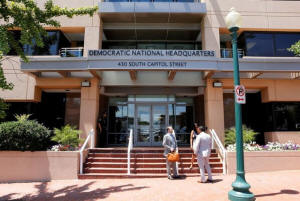|
Russians steal research on Trump in hack
of U.S. Democratic Party
 Send a link to a friend
Send a link to a friend
 [June 15, 2016]
By Dustin Volz and Emily Stephenson [June 15, 2016]
By Dustin Volz and Emily Stephenson
WASHINGTON (Reuters) - Hackers believed to
be working for the Russian government broke into the Democratic National
Committee's computer network, spied on internal communications and
accessed research on presumptive Republican presidential nominee Donald
Trump, the committee and security experts said on Tuesday.
Two separate groups entered the DNC's system, and one read email
and chat communications for nearly a year before being detected,
according to the committee and CrowdStrike, the cyber firm that
helped clean up the breach.
Russian spies also targeted the networks of Trump and Democratic
presidential candidate Hillary Clinton, as well as the computers of
some Republican political action committees, the Washington Post
quoted U.S. officials as saying, although details were not
available.
A Clinton campaign official said there was no evidence the
campaign's information systems had been hacked.
A Russian government spokesman denied involvement in the breach.
"I completely rule out a possibility that the (Russian) government
or the government bodies have been involved in this," Dmitry Peskov,
a Kremlin spokesman, told Reuters in Moscow.
 The intrusion is emblematic of the sophistication of Russian
hackers, who intelligence officials have long viewed as the most
talented of U.S. adversaries in cyberspace.
The Democratic Party had been aware of efforts to hack Trump
material for two months, and U.S. intelligence agencies were
involved in efforts to find out who was behind the hacking, a source
familiar with Trump opposition research said.
The source said Democratic Party operatives believed the hacking was
conducted by the Russian government. The research includes material
on Trump's business efforts in Azerbaijan, Georgia, Serbia and
Russia, according to information made available to Reuters.
Cyber attacks against political candidates and organizations are
common worldwide. U.S. National Intelligence Director James Clapper
said last month he was aware of attempted hacks on campaigns and
related groups and he expected to see more as the Nov. 8
presidential election nears.
U.S. Representative Jim Langevin, a Democrat and co-founder of the
congressional cybersecurity caucus, said it was "disconcerting" that
independent groups penetrated the DNC and that one was able "to stay
embedded for nearly a year."
But the groups are extremely sophisticated, Langevin said, and have
previously been implicated on attacks at the White House, the State
Department and the German Bundestag, as well as a number of private
companies.
RUSSIAN BEARS ON THE LOOSE
The DNC contacted CrowdStrike in May and within 24 hours it began
investigating unusual activity on the group's network, said Dmitri
Alperovitch, the company’s co-founder and chief technology officer.
It identified two hacking groups and both were kicked out this
weekend, he said.
The first, which CrowdStrike named Cozy Bear, entered the DNC’s
systems last summer, according to the firm. It primarily monitored
email and chat conversations and may be working for Russia's Federal
Security Service, or FSB, Alperovitch said.
[to top of second column] |

The headquarters of the Democratic National Committee is seen in
Washington, U.S. June 14, 2016. REUTERS/Gary Cameron

Russian President Vladimir Putin once ran the FSB.
The second group, nicknamed Fancy Bear, is probably working on
behalf of Russia's military, Alperovitch said. It gained entry in
late April and “went straight to the oppo research ... on Donald
Trump and exfiltrated some of it,” he said.
Alperovitch said both groups were among "the best threat actors that
we’ve ever encountered" but they did not appear to be working
together. He was not sure how the intrusions occurred but suspected
the hackers may have leveraged "spearphishing" emails to trick DNC
employees into downloading malicious code onto their network.
“When we discovered the intrusion, we treated this like the serious
incident it is," Rep. Debbie Wasserman Schultz, chairwoman of the
DNC, said in a statement. "Our team moved as quickly as possible to
kick out the intruders and secure our network."
Trump's interest in Russia goes back to the 1980s, with a 1990
Vanity Fair article citing news program appearances in which Trump
offered his own services as a negotiator with Russia.
Information made available to Reuters indicates Trump tried on at
least three occasions - in 2004, 2008 and 2013 - to get involved in
business deals in Russia.
In 2013, he and an Azerbaijani-Russian oligarch, Aras Agalarov,
jointly put on a Miss Universe competition in Moscow, and Trump was
photographed with Agalarov's wife, son and daughter.
The last two U.S. presidential cycles in 2008 and 2012 witnessed a
barrage of cyber attacks from a range of adversaries targeting
President Barack Obama's campaign and the campaigns of his
Republican foes.

U.S. intelligence officials have said many previous assaults were
linked to Chinese hackers.
(Reporting by Dustin Volz, Amanda Becker, Emily Stephenson, Roberta
Rampton and Susan Heavey in Washington and Vladimir Soldatkin in
Moscow; Additional reporting by Mark Hosenball in Zurich; Writing by
John Whitesides and Mohammad Zargham; Editing by James Dalgleish)
[© 2016 Thomson Reuters. All rights
reserved.]
Copyright 2016 Reuters. All rights reserved. This material may not be published,
broadcast, rewritten or redistributed. |